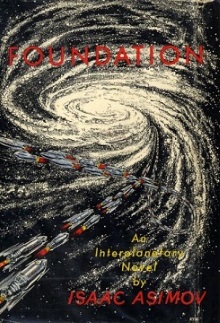
So yeah, I’ve never read Isaac Asimov’s Foundation books before this which is embarrassing for a fan of science-fiction. I’ve read plenty of his short stories and even one or two his Robots novels but never any of the Foundation books themselves. I’ve inevitably absorbed some of what it’s about through cultural osmosis but I suppose it’s high time that I actually read them for myself.
The book consists of five stories, each with different characters and widely apart in time, though the first really only serves as a prologue that explains how and why the Foundation is being set up. Visionary and mathematician Hari Seldon has perfected the science of psychohistory which allows him to predict large scale events far into the future. Using it, he has foreseen the imminent break-up of the Galactic Empire and the mass death and chaos that is the result. He has therefore decided to create the Foundation on a planet located on the edge of imperial space to safeguard human knowledge and perhaps act as a seed for the formation of a future Second Empire. Seldon himself dies soon afterwards but as his Foundation grows in influence and undergoes various crises over the next 150 years as told in the other stories, a recording of him is periodically activated to assist the later leaders in finding a solution, further demonstrating his god-like mastery of future events.
The problem with writing about a book as old as this one seeing as it was first published in 1951, is that anything interesting about it has already been said by others many, many times over. I suppose I can only do my best given that these are my personal impressions, just be aware that I make no pretensions as to the originality of these thoughts. I will start off by saying that the book remains an engrossing and fun read even after all this time. I still recall an old comment about how Asimov isn’t much of a writer but he’s a great storyteller. In this case, his prose is plain and maybe even a little too crude but it does a fine job of getting his point across and the stories make for a great read. I loved the natural progression of how the Foundation has to evolve to face different challenges starting from the claim that it was set up solely to create the Encyclopedia Galactica being a misdirection. I could more or less guess the direction and even the little blurbs preceding each story more or less give the game away but they’re entertaining stories nonetheless. This is grand scale sociological science-fiction and it’s especially gratifying that the Foundation is so pragmatic when most modern stories tend to go for idealist utopias.
Unfortunately while psychohistory is a cool idea I have a hard time finding it plausible even if Asimov is smart enough to tack on the condition that it works only if the subjects it is being used on are unaware of it. One big problem is that it seems to posit that societies and organizations shift and change but that the technological level is either constant or in decline and that the human condition is static. For example, there are no life extension technologies and people everywhere live pretty much the same way, which seems silly given how big the galaxy is. The biggest thing that Asimov missed, writing this when he did, is information technology as computers are totally absent in these stories. As such characters exchange information on microfilm and the fabled multi-volume Encyclopedia Galactica really does seem to exist as physical objects. Knowing what we do today about information storage and transmission, it’s hard to buy how Seldon expected the Foundation to be the sole or the primary repository of technological knowledge after the collapse of the Empire.
Another type of objection that I have is that problems tend to be solved by heroic types who more or less fit the same mould. The theme that holds true across all of the stories is that at the inflection point of each crisis, the Foundation needs to abandon its previously successful survival strategy and embark on a bold new one. This is opposed by conservative elements who want to keep things as they are. Having a heroic figure to lead each change makes for a more dramatic story but it seems thematically wrong that they are invariably single men of action who are able to seize the moment. It feels to me that it would be more appropriate for an organization like the Foundation to be rational enough and self-aware enough to have these changes be a form of collaborative effort. This is yet another way in which the novel feels so hopelessly old-fashioned that it needs a heroic man at the center of each story.
It would be heresy, but looking at this through modern eyes, it seems to me that this would work better as a fantasy series, especially when Seldon is already a sort of messiah-like prophet. Preserving magic seems more plausible than needing to preserve technologies but I guess that might be down to me being more optimistic that science, one learned, tends to stick around so long as it’s useful. Overall I enjoyed reading this very much but I also found it to be very dated, what with the talk of atomics being the be all end all of technology and how interplanetary travel seems easy but industry seems hard. It’s a good enough read that I will probably read the later books at some future date and I can see why this became as popular as it has but I can’t say that it’s one of my favorites. It’s ultimately just too simplistic and reductionist by modern standards.